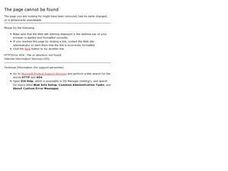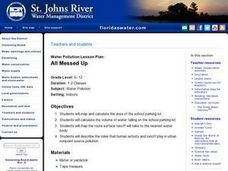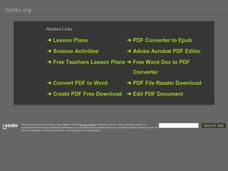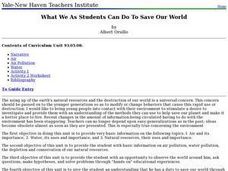Curated OER
"Hard" Data from Space
Students use satellite images to analyze development patterns within Baltimore City. They prepare a land cover map for Baltimore indicating the prevalence of impervious surfaces and explore how these patterns affect water pollution.
Curated OER
CONTAMINANT SCAVENGER HUNT
Learners identify substances and activities within a household that contribute to water pollution and identify safe cleaning alternatives for commercial cleaning products.
Curated OER
G is for Groundwater
In this groundwater worksheet, students read the sentences 'Groundwater is beneath the soil,' and 'G is for Groundwater.' Students may color the picture of the groundwater image.
Curated OER
Dirty Water
Students, through a case study of actual water sources in Washington State, identify major sources of aquatic pollution. They also categorize pollutants, make inferences about the effects of pollutants on the environment and construct...
Curated OER
Preventing Water Pollution
Fourth graders write at least two ways to clean the water and two ways to prevent pollution with appropriate guesses, striving not to create any more pollution in the water. They understand how pollution affects water as well as the rest...
Curated OER
Water Pollution
First graders investigate what causes water pollution and conduct a water pollution experiment. They listen to the story "What Polluted the Potomac?," and during the story pour small containers of dirty water into a large container at...
Curated OER
Groundwater Modeling
Students evaluate the effects of point and non-pointy sources of water pollution using a model. They assess human impact on water quality. Students build a model which represents an aspect of the hydrosphere and compare their model with...
Curated OER
Language Arts: Investigating Issues That Matter
Students are able to become more informed about the dangers of water contamination by sharing their prior knowledge with each other. They discover the importance of communicating these dangers to the public.
Curated OER
Water Pollution Lesson Plan: Don't Trust Your Eyes
Young scholars develop a list of actions they could perform that would protect our water resources from pollution. They formulate hypotheses, conduct experiments and draw conclusions about actual pollutants found in our water supply.
Curated OER
Marine Debris
Learners will perform experiments to examine if debris will float, or blow in the wind. They discuss the effects of these characteristics on marine debris.
Curated OER
Analyze the Results
Pupils conduct water tests and sample macroinvertebrates from a nearby source to make a general determination about the overall quality of water. They use worksheets and analyze data as part of a larger unit.
Curated OER
Don't Trust Your Eyes
Students brainstorm a list of possible actions that they could do to protect the water resources from pollution. They create hypotheses and conclusions by completing experiments and observing different pollutants.
Curated OER
What Are We?
Students describe different types of water pollutants. They complete experiments in which they observe the affects of water pollution on algae. They also brainstorm and list three causes of each water pollutant.
Curated OER
All Messed Up
Pupils begin the experiment by mapping and calculating their school parking lot. They calculate the volume of water falling on the lot and map the route the water runoff takes. They discuss the roles that humans play in affecting water...
Curated OER
What's The Flow?
Students examine urban runoff and identify peak flows. They examine causes for different flow rates, and complete worksheets and a graph.
Curated OER
Water Quality Monitoring
Young scholars study the water quality of a stream in their area, by measuring the temperature, pH, alkalinity and conductivity. They integrate biology with earth science when using the microscope to study the living organisms in the water.
Curated OER
The Atrazine Dilemma
Students understand how farming practices and the topography of a region can effect the health and safety of all living things. Students play a game which helps them understand how the chemical Azatrine has spread in the watershed.
Curated OER
The Five Finger Exercise
Students understnad the importance of keeping our rivers and streams pollution free by remembering the major rivers of northeast Kansas. The see how the rivers contain particles of every substance that drains into them.
Curated OER
How Much Azatrine?
Students understand the connections among people, places, and environments in the local school and community, Kansas and its surrounding states, the U.S. and its region, and the world.
Curated OER
Clean Kansas Water
Students gain an understanding of ways we can be responsible custodians of our water supply. Students explore the governor's clean water initiative involving the Lower Kansas/Republican river basin and the pollutants present there.
Curated OER
Cool, Clear Water - Or Is It?
Students use a problem solving method to offer a solution to one of the water quality problems within the Kansas Lower Republican River Basin. Groups research a problem area, then produce a skit, poem, song or story to illustrate the...
Curated OER
The Chemistry of Water / Industrial Waste at My High School
Students gain factual knowledge of the nature of industrial waste at on their school site. They gain process knowledge of the laboratory techniques and collection procedures for wastewater samples.
Curated OER
What We As Students Can Do To Save Our World
Students investigate air and water pollution, and the conservation of natural resources.
























